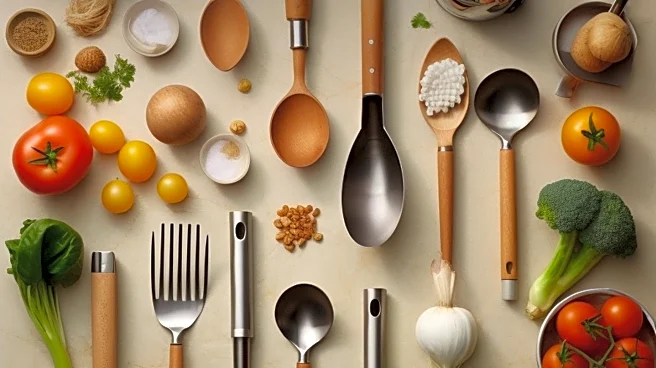What's Happening?
CNET has published a guide detailing essential kitchen tools for those new to meal kits. Meal kits have gained popularity for their convenience, offering pre-portioned ingredients and recipes delivered
directly to consumers' doors. The article emphasizes the importance of having certain kitchen items to enhance the meal kit experience. Key tools include a chef's knife, cutting board, baking sheet pan, pot, mixing bowl, peeler, lemon zester, meat thermometer, and foil. These items are recommended to ensure smooth preparation and cooking of meal kit recipes, which often focus on quick and easy meals. The guide aims to help individuals, especially those less experienced in cooking, to confidently prepare meals and enjoy the process.
Why It's Important?
The rise of meal kits reflects a shift in consumer behavior towards convenience and time-saving solutions in meal preparation. As more people opt for meal kits, understanding the necessary kitchen tools can enhance their cooking experience and lead to better meal outcomes. This trend impacts the kitchenware industry, potentially increasing demand for specific tools and gadgets. Additionally, meal kits can encourage healthier eating habits by providing balanced meals and reducing reliance on fast food. For busy individuals or those new to cooking, meal kits offer a practical solution to home-cooked meals, fostering culinary skills and confidence in the kitchen.
What's Next?
As meal kits continue to grow in popularity, companies may innovate further by offering more specialized kits or expanding their product lines to include kitchen tools. Consumers might see bundled offers that include essential kitchen items with meal kit subscriptions. Additionally, there could be an increase in educational content aimed at helping users maximize their meal kit experience. The kitchenware industry may respond by developing new products tailored to meal kit users, focusing on ease of use and multifunctionality.
Beyond the Headlines
The meal kit trend could lead to broader cultural shifts in how people approach cooking and meal preparation. It may encourage more people to cook at home, impacting dining habits and potentially reducing food waste through portion control. Furthermore, meal kits could play a role in promoting sustainable practices by sourcing ingredients locally and minimizing packaging waste. As consumers become more accustomed to meal kits, there may be increased interest in culinary education and exploration of diverse cuisines.









